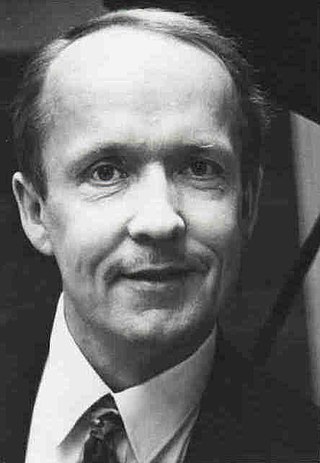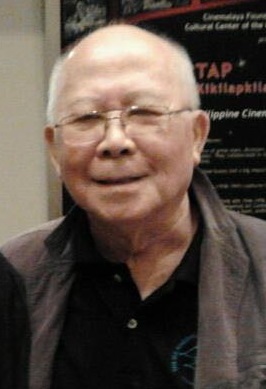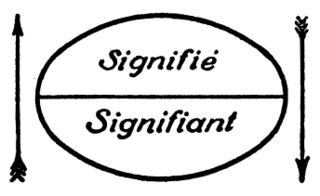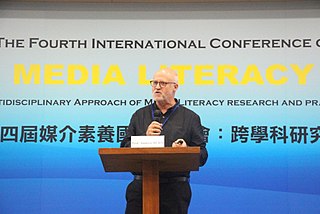
Umberto Eco was an Italian medievalist, philosopher, semiotician, novelist, cultural critic, and political and social commentator. In English, he is best known for his popular 1980 novel The Name of the Rose, a historical mystery combining semiotics in fiction with biblical analysis, medieval studies and literary theory, as well as Foucault's Pendulum, his 1988 novel which touches on similar themes.

Eero Aarne Pekka Tarasti is a Finnish musicologist and semiotician, currently serving as Professor Emeritus of Musicology at the University of Helsinki. He has remarkably contributed to semiotics of music.

Molefi Kete Asante is an American professor and philosopher. He is a leading figure in the fields of African-American studies, African studies, and communication studies. He is currently a professor in the Department of Africology at Temple University, where he founded the PhD program in African-American Studies. He is president of the Molefi Kete Asante Institute for Afrocentric Studies.
Marcel Danesi is Professor of Semiotics and Linguistic Anthropology at the University of Toronto. He is known for his work in language, communications and semiotics and is Director of the program in semiotics and communication theory. He has also held positions at Rutgers University (1972), University of Rome "La Sapienza" (1988), the Catholic University of Milan (1990) and the University of Lugano.
Dick Hebdige is an English media theorist and sociologist, and a professor emeritus of art and media studies at the University of California, Santa Barbara, where he taught from 2004 to 2021. His work is commonly associated with the study of subcultures, and its resistance against the mainstream of society. His current research interests include media topographies, desert studies, and performative criticism.

Bienvenido L. Lumbera was a Filipino poet, critic and dramatist. Lumbera is known for his nationalist writing and for his leading role in the Filipinization movement in Philippine literature in the 1960s, which resulted in his being one of the many writers and academics jailed during Ferdinand Marcos' Martial Law regime. He received the Ramon Magsaysay Award for Journalism, Literature and Creative Communications in 1993, and was proclaimed a National Artist of the Philippines for literature in 2006. As an academic, he is recognized for his key role in elevating the field of study which would become known as Philippine Studies.

Lawrence Grossberg is an American scholar of cultural studies and popular culture whose work focuses primarily on popular music and the politics of youth in the United States. He is widely known for his research in the philosophy of communication and culture. Though his scholarship focused significantly throughout the 1980s and early 1990s on the politics of postmodernism, his more recent work explores the possibilities and limitations of alternative and emergent formations of modernity.
Willard D. "Wick" Rowland is an American executive who is president and CEO emeritus of Colorado Public Television (KBDI/12), a PBS station in Denver, Colorado. He is professor emeritus and dean emeritus of the University of Colorado at Boulder.
John Fiske was a media scholar and cultural theorist who taught around the world. His primary areas of intellectual interest included cultural studies, critical analysis of popular culture, media semiotics, and television studies.
John Hartley, , FAHA,, FLSW, ICA Fellow, is an Australian academic and a John Curtin Distinguished Emeritus Professor. He was formerly Professor of Cultural Science and the Director of the Centre for Culture and Technology (CCAT) at Curtin University in Western Australia, and Professor of Journalism, Media and Cultural Studies at Cardiff University. He has published over twenty books about communication, journalism, media and cultural studies, many of which have been translated into other languages. Hartley is an adjunct professor with CCAT.
Klaus Krippendorff was a communication scholar, social science methodologist, and cyberneticist. and was the Gregory Bateson professor for Cybernetics, Language, and Culture at the University of Pennsylvania's Annenberg School for Communication. He wrote an influential textbook on content analysis and is the creator of the widely used and eponymous measure of interrater reliability, Krippendorff's alpha. In 1984–1985, he served as the president of the International Communication Association, one of the two largest professional associations for scholars of communication.

David Cortright is an American scholar and peace activist. He is a Vietnam veteran who is currently Professor Emeritus and special adviser for policy studies at the Keough School of Global Affairs and Kroc Institute for International Peace Studies at the University of Notre Dame, and the author, co-author, editor or co-editor of 22 books. Cortright has a long history of public advocacy for disarmament and the prevention of war.
Daniel Chandler is a British visual semiotician based since 2001 at the Department of Theatre, Film and Television Studies at Aberystwyth University, where he has taught since 1989. His best-known publication is Semiotics: The Basics, which is frequently used as a basis for university courses in semiotics, and the online version Semiotics for Beginners. He has a particular interest in the visual semiotics of gender and advertising.
Alec McHoul is a British-Australian academic. He has written numerous books and articles, many of which are informed by ethnomethodology. He is currently Emeritus Professor at Murdoch University. McHoul was born in Wallasey, a town on the Wirral Peninsula, England. In 1973 he graduated from the University of Lancaster, with a Bachelor of Arts (Hons) in Literature and Linguistics and, in 1974, a Master of Arts. In 1975 he moved to Australia. In 1978 he was awarded a Doctorate from the Australian National University.
Harold Lloyd "Bud" Goodall Jr. was an American scholar of human communication and a writer of narrative ethnography. He was a professor in the Hugh Downs School of Human Communication at Arizona State University.
Stewart M. Hoover is a Professor of Media Studies and Professor Adjoint of Religious Studies at the University of Colorado at Boulder. He is the founder and director of the Center for Media, Religion and Culture. His research interest centers on media audience and reception studies rooted in cultural studies, anthropology and qualitative sociology. He is known for his work on media and religion, particularly in the phenomenon of televangelism, and later in religion journalism. His most recent work involves household-level studies of media audience practices of meaning-making and identity. Supported by a series of grants from the Lilly Endowment and the Ford Foundation, this work investigates the extent to which the media sphere as a whole and the various media which comprise it constitute a central site of meaning practice in contemporary domestic and global life. Through the center he directs, he has also become influential in scholarly discourses about the public understanding and role of religion globally and the ways those are rooted in its mediation.
Ernest A. Hakanen is a social theorist. He is currently a professor of communication at Drexel University, specializing in media effects and history, and was the founding director of the Communication, Culture and Media graduate programs. His scholarly articles have appeared in journals such as Journalism Quarterly, Popular Music, Explorations in Media Ecology, the Journal of Social Semiotics, the Journal of Broadcasting and Electronic Media, and the Journal of Information Science.

In semiotics, signified and signifier are the two main components of a sign, where signified is what the sign represents or refers to, known as the "plane of content", and signifier which is the "plane of expression" or the observable aspects of the sign itself. The idea was first proposed in the work of Swiss linguist Ferdinand de Saussure, one of the two founders of semiotics.

Andrew Burn is an English professor and media theorist. He is best known for his work in the fields of media arts education, multimodality and play, and for the development of the theory of the Kineikonic Mode. He is Emeritus professor of Media at the UCL Institute of Education.

Norman Kent Denzin was an American professor of sociology. He was an emeritus professor in the Department of Sociology at the University of Illinois at Urbana–Champaign, where he was research professor of communications, College of Communications scholar, professor of sociology, professor of cinema studies, professor in the Unit for Criticism and Interpretive Theory. Denzin's academic interests included interpretive theory, performance studies, qualitative research methodology, and the study of media, culture and society.








